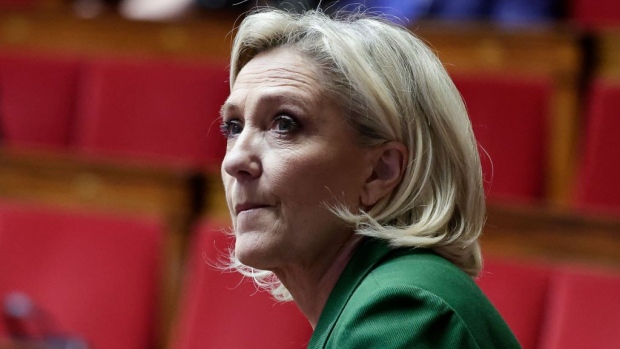Apr 18, 2024
Le Pen’s Party Wants the ECB to Help Fund the Green Transition
, Bloomberg News

(Bloomberg) -- The far-right party of Marine Le Pen, which is on course to trounce French President Emmanuel Macron’s group in this year’s European elections, wants the European Central Bank to resume quantitative easing to help fund climate investment.
“If we want to achieve this major transition, we have to use the monetary weapon — it’s the only way to actually finance such challenges,” Jean-Philippe Tanguy, a National Rally lawmaker, told a debate late Wednesday. “We propose a second phase of QE and to use the ECB to finance this transition over 10, 20, 30, 40, 50 years, based on the duration of projects.”
Tanguy also urged the European Union to revisit its emissions-reduction roadmap, the Green Deal, deeming it impractical and burdensome for lower-income and rural communities.
The remarks — at an event in Angers, western France, that was moderated by Bloomberg News — offer rare glimpses into Le Pen’s policy proposals, which haven’t been updated since she lost the presidential election to Macron in 2022.
While the RN wants to cut red tape for companies and opposes what it calls “punitive ecology,” Tanguy acknowledged the need for billions of euros of investments to upgrade homes for energy efficiency, enhance rail infrastructure, and develop new nuclear facilities to curb emissions.
The ECB, which is prohibited from funding governments, is currently winding down earlier bond-buying programs that were created to stave off possible deflation in the wake of the continent’s debt crisis and after Covid-19 struck.
The bank has also looked at the merits of employing so-called Green QE — skewing bond-buying programs toward assets that contribute to reducing carbon emissions, something that central banks in Asia have already embraced.
The RN also hopes to revive a wealth tax to finance struggling public services, according to Tanguy, referring to a levy that Macron scrapped.
“These orders of magnitude can’t be financed by your taxes,” he said. “So we have to make sure the most privileged also contribute.”
Tanguy said he wasn’t worried that the influx of money he’s suggesting could stoke prices. “If you put this money creation into concrete productive investment objectives, there won’t be any inflation,” he said.
He also dismissed the feasibility of the EU’s target to phase out combustion-engine cars by 2035 and opposed measures targeting aviation emissions.
Polling suggests a significant surge in support for RN, with 32.5% of voters intending to vote for it in June, compared with 18% for Macron’s party, according to an Ifop-Fiducial online poll of 1,349 people published this week by newspaper Le Figaro.
But the alignment of far-right parties within the European parliament remains uncertain, given divisions between groups such as Identity and Democracy — which includes RN — and European Conservative and Reformists, home to Italy’s Giorgia Meloni.
©2024 Bloomberg L.P.







